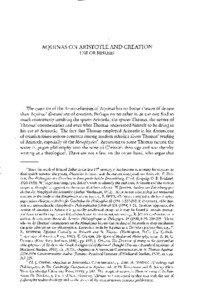Por favor, use este identificador para citar o enlazar este ítem:
https://repositorio.uca.edu.ar/handle/123456789/12769| Campo DC | Valor | Lengua/Idioma |
|---|---|---|
| dc.contributor.author | Smith, Timothy L. | es |
| dc.date.accessioned | 2021-11-08T12:24:25Z | - |
| dc.date.available | 2021-11-08T12:24:25Z | - |
| dc.date.issued | 2000 | - |
| dc.identifier.citation | Smith, T. L. Aquinas on Aristotle and creation : use or misuse [en línea]. Sapientia. 2000, 55 (207). Disponible en: https://repositorio.uca.edu.ar/handle/123456789/12769 | es |
| dc.identifier.issn | 0036-4703 | - |
| dc.identifier.uri | https://repositorio.uca.edu.ar/handle/123456789/12769 | - |
| dc.description.abstract | The question of the Aristotelianism of Aquinas has no better theatre of debate than Aquinas' discussions of creation. Perhaps on no other issue can one find so much controversy involving the «pure» Aristotle, the «pure» Thomas, the nature of Thomas' commentaries and even what Thomas understood himself to be doing in his use of Aristotle. The fact that Thomas employed Aristotle in his discussions of creation raises serious concerns among modern scholars about Thomas' reading of Aristotle, especially of the Metaphysics'. According to some Thomas turned the water of pagan philosophy into the vine of Christian theology and was thereby writing as a theologian2. There are not a few, on the other hand, who argue that Thomas' position is warranted by Aristotle's own principies and hence not exactly abusive of the texts3. But therein lies the real question: is the Aristotle who appears in Thomas' discussions of creation the historical Aristotle or a Thomistic Aristotle? Are the arguments ones that Aristotle would recognize as his own or accept them as logically deducible from his own? Even in his own day Thomas' use of Aristotelian philosophy was not without controversy. We can see a great uneasiness about Aristotelian philosophy in the condemnations of 1277 in which Thomas' own teachings seem to have been implicated4. The heated debates of that time are now continued in the controversy over what Thomas understood Aristotle to know and what constitutes a proper use of his texts5. Thomas was no doubt interested in pointing out the errors in Aristotle6. Yet at other times, he radically transforms Aristotelian terminology without calling attention to it7. Among Thomísts there are those who want to emphasize the profound contribution made to philosophy by the Christian philosopher. Others see Thomas as simply a good philosopher advancing Aristotle's arguments on their own terms. Still others have no concern for evaluating Aquinas as a philosopher, Christian or otherwise, and view his work as inescapably theological, spot through with the fuller perspective that revelation provides... | es |
| dc.format | application/pdf | es |
| dc.language.iso | eng | es |
| dc.publisher | Pontificia Universidad Católica Argentina. Facultad de Filosofía y Letras | es |
| dc.rights | Acceso abierto | * |
| dc.rights.uri | http://creativecommons.org/licenses/by-nc-sa/4.0/ | * |
| dc.source | Sapientia Vol. LV, No. 207, 2000 | es |
| dc.subject | Tomás de Aquino, Santo, 1225-1274 | es |
| dc.subject | Aristóteles, 384-322 a. C. | es |
| dc.subject | POTENCIA | es |
| dc.subject | CREACION | es |
| dc.subject | METAFISICA | es |
| dc.title | Aquinas on Aristotle and creation : use or misuse | es |
| dc.type | Artículo | es |
| uca.disciplina | FILOSOFIA | es |
| uca.issnrd | 1 | es |
| uca.affiliation | Fil: Smith, Timothy L. Thomas Aquinas College; Estados Unidos | es |
| uca.version | publishedVersion | es |
| item.grantfulltext | open | - |
| item.fulltext | With Fulltext | - |
| item.languageiso639-1 | en | - |
| Aparece en las colecciones: | SAP - 2000 Vol LV nro. 207 | |
Ficheros en este ítem:
| Fichero | Descripción | Tamaño | Formato | |
|---|---|---|---|---|
| aquinas-on-aristotle.pdf | 419,05 kB | Adobe PDF |  Visualizar/Abrir |
Visualizaciones de página(s)
65
comprobado en 27-abr-2024
Descarga(s)
362
comprobado en 27-abr-2024
Google ScholarTM
Ver en Google Scholar
Este ítem está sujeto a una Licencia Creative Commons

